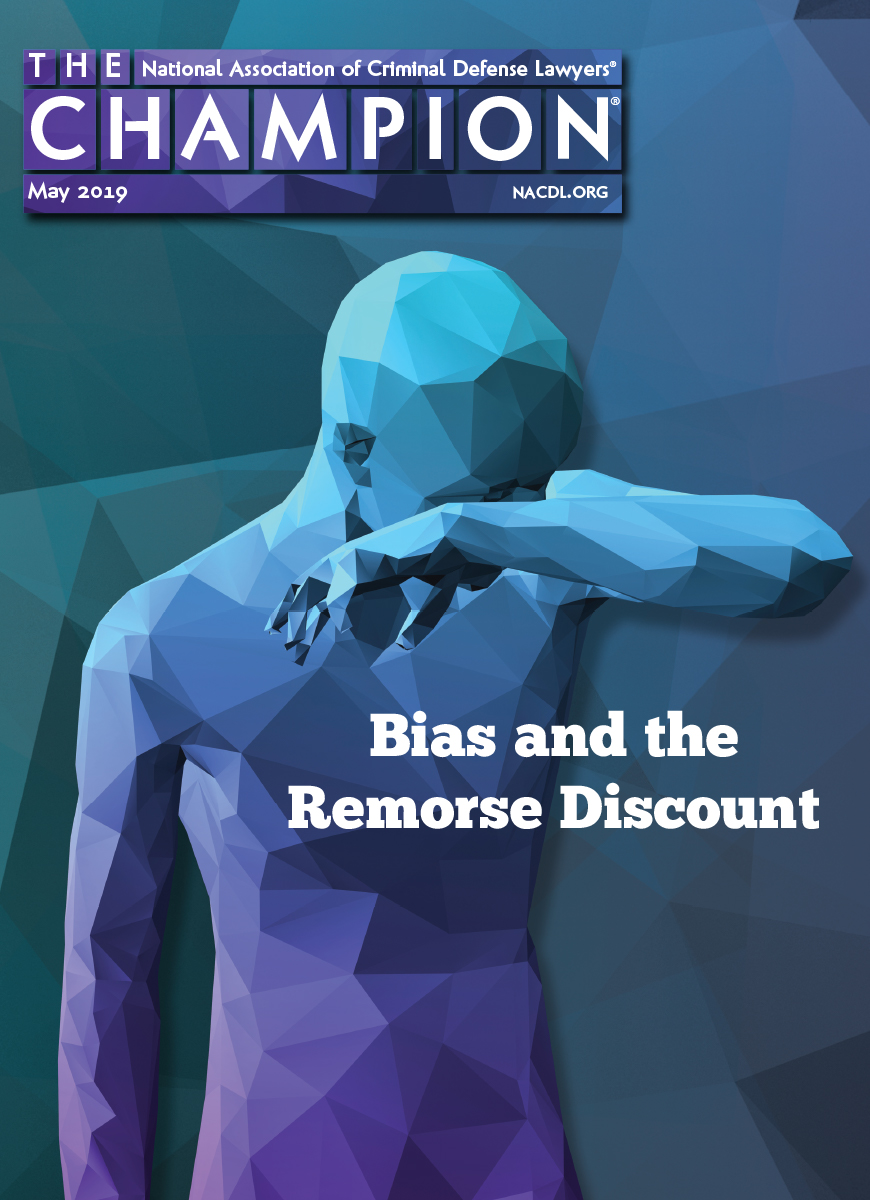May 2019

Technology makes lawyers more efficient, but lawyers must remember to consider the ethics rules when implementing systems and office procedures to manage client information and data protection.
Articles in this Issue
-
Affiliate News
What events are NACDL affiliates hosting this month? Find out here.
-
Bias and the Remorse Discount
The decision to credit a client’s remorse may make a difference at sentencing, but remorse is difficult to assess. People are overconfident in their ability to interpret mental states and sincerity: accuracy rates are no better than chance. Because the decision whether to believe an expression of remorse is subjective, it is a fertile area in which implicit bias can flourish. Professor Eve Hanan suggests steps that advocates can take to counteract bias in remorse assessments.
-
Book Review: Lincoln’s Last Trial by Dan Abrams and David Fisher
This month Allan F. Brooke II reviews Lincoln’s Last Trial by Dan Abrams.
-
Book Review: Punishment Without Crime by Alexandra Natapoff
This month Robert C. Boruchowitz reviews Punishment Without Crime by Alexandra Natapoff.
-
From the President: The Consistently Inconsistent U.S. Supreme Court in Matters of Life or Death
Recent U.S. Supreme Court decisions illustrate how the continued use of the death penalty will inevitably invite arbitrary results and fails to serve any legitimate sentencing purpose.
-
Getting Scholarship Into Court Project
The “Getting Scholarship Into Court Project” brings helpful law review articles and other writings to the attention of criminal defense attorneys. The project’s purpose is to identify scholarship that will be especially useful to courts and practitioners. Summarized on this page are articles the project’s advisory board recommends that practicing lawyers take the time to read.
-
Harjo v. City of Albuquerque: A Road Map for Challenging Government Forfeiture Programs
The city of Albuquerque seized Arlene Harjo’s car after her son borrowed it and was arrested for DUI. Her case shows that a forfeiture statute may appear constitutional on its face but, in actuality, may provide improper financial incentives to prosecutors and police to seize citizens’ property for their own or their organization’s benefit. The Harjo case offers lessons on how to successfully mount a due process challenge to forfeiture statutes.
-
Informal Opinion: Delay and ‘Psychological’ Effects Contribute to Violation of Speedy Trial Right
The U.S. Court of Appeals for the Second Circuit held that defendants’ right to a speedy trial was violated because they waited more than five years for trial.
-
Inside NACDL: ‘Criminal Justice Is a Shared Responsibility’
The Military Commission Travesty at Guantanamo Leads to Judicial Reaffirmation of a Basic Principle
A judge, while presiding over a case at Guantanamo, secretly negotiated for a job as an immigration judge in the U.S. Department of Justice (Executive Office for Immigration Review). Thus, the judge presided over a case in which his potential employer appeared. That alone should be sufficient grounds to require disqualification.
-
Law Office Management: Designing Your Law Firm to Work for You
Many user-friendly technologies allow lawyers to work faster, smarter, and deliver a superior product and experience to clients.
-
Practice Points: Two Demonstratives to Incorporate into Your Next Case
In today’s media-savvy society, it is critical that attorneys use persuasive demonstrative aids to educate jurors about important or complex issues. Jurors not only learn concepts or facts in a case, but also remember specific demonstratives to support their position and convince other jurors why they view a particular issue a certain way. Through his discussion of timelines and comparative reasoning charts, Josh Dubin shows that persuasive demonstrative aids are no longer a luxury item reserved for “big” cases.
-
What the First Step Act Means for Federal Prisoners
The FIRST STEP Act directly impacts accused and sentenced prisoners in myriad ways. Defense attorney Todd Bussert discusses Bureau of Prisons-related aspects of the law, including changes to the time credit calculus, avenues by which prisoners can earn both earlier pre-release transfers and placement on supervised release, and avenues to petition courts for reductions in sentence for extraordinary and compelling reasons. Bussert points out that implementation of some of the Act’s provisions may be delayed.
